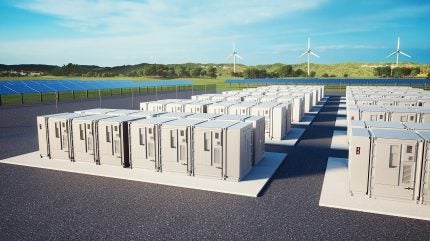
NextStar Energy Inc, a Canadian battery manufacturing joint venture between Stellantis and South Korea’s LG Energy Solution, is switching some of its production capacity to lithium-iron-phosphate (LFP) batteries to tap into growing demand for batteries for energy storage systems (ESS).

Discover B2B Marketing That Performs
Combine business intelligence and editorial excellence to reach engaged professionals across 36 leading media platforms.
The company is converting part of its battery plant in Windsor, Ontario, to include the production of LFP battery cells “designed to support commercial and grid-scale energy storage,” starting in November. The plant, which has a production capacity of 50 gigawatt-hour (GWh) per year, was originally built to produce nickel-cobalt-manganese (NCM) batteries for electric vehicles (EVs).
NextStar pointed out that LFP batteries “are suitable for a wide range of battery applications, especially ESS.” They will be produced alongside nickel-manganese-cobalt (NMC) battery cells, which are mainly used to power EVs.
The company confirmed that the move reflects changing market dynamics, with its main customer Stellantis slowing its rollout of battery electric vehicles (BEVs) in North America. Demand for BEVs in the region is expected to slow sharply following the withdrawal at the end of September of tax incentives in the US introduced under the Inflation Reduction Act (IRA) by the Biden administration.
Canada has also been unable to make significant progress in trade negotiations with the US, which is a key market for its vehicle exports. The Canadian government recently initiated a formal dispute-resolution process against Stellantis following the automaker’s decision to relocate planned Jeep Compass production from its Brampton, Ontario, plant to Illinois in the US.
NextStar suggested that the ESS battery market is expanding rapidly, and is expected to grow significantly over the next decade, driven by AI data centres and the increasing need for electricity grid stability.
The company’s CEO, Danies Lee, said in a statement: “NextStar’s expansion into energy storage reflects the company’s ability to respond and adapt to changing markets. By adding to our portfolio, we are not only demonstrating our resilience and flexibility as a company, but also our commitment to sustainable innovation, and a lasting footprint here in Windsor.”
NextStar said it has been “conducting material testing and equipment calibration in preparation for mass production, which is scheduled to begin in the coming weeks.”






